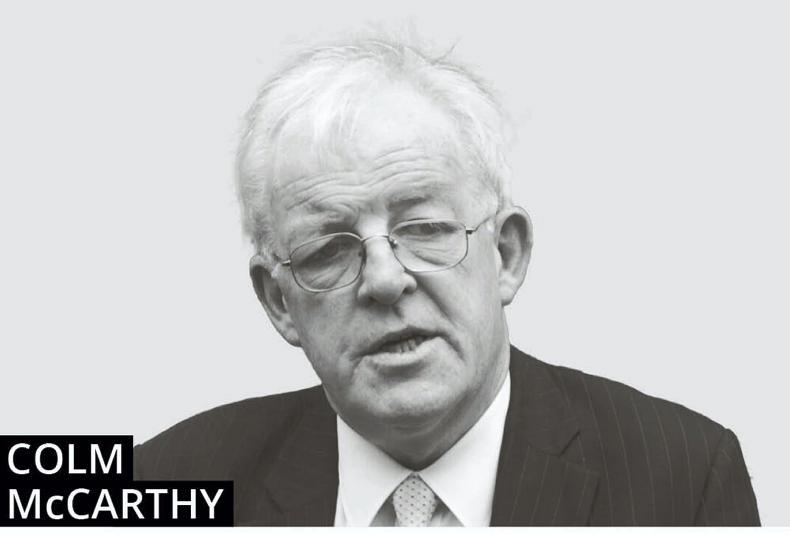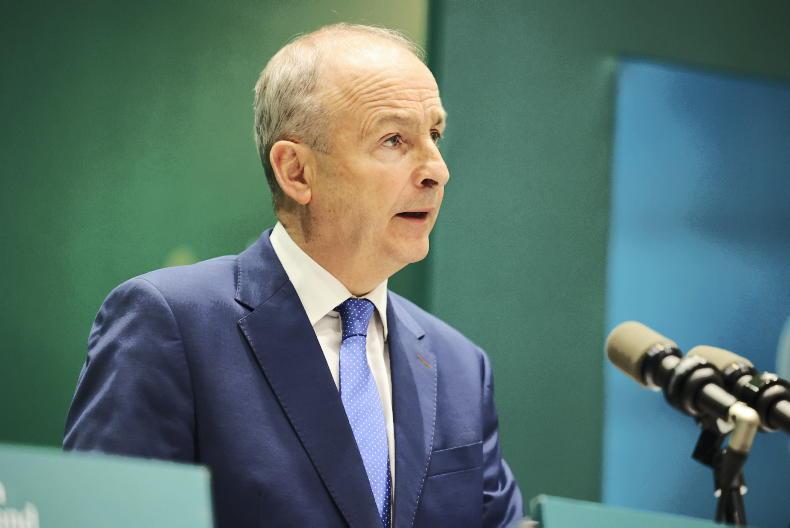As the calendar ticks down towards a general election, the pattern in the opinion polls attracts ever-closer scrutiny, especially in the political parties.
The former Labour leader Pat Rabbitte writes a regular column in the Sunday Business Post and devoted his latest offering to the travails of his former comrades. Noting that denials from politicians that they pay any attention to opinion polls are simply untrue, and he should know, he attributes the current assaults on Brendan Howlin’s leadership to the party’s poor poll showings.
In broad terms, Fine Gael has been doing well in recent polls, Fianna Fáil and Sinn Féin only so-so, while independents and Labour have been registering very weak numbers. One recent poll put national support for Labour at 3%, the lowest level since opinion polls were first undertaken in this country.
Miserable
If that showing were to be repeated in an actual general election, Labour would struggle to retain the miserable seven seats it secured in 2016.
Various Labour councillors around the country have been calling for a change of leadership.
The elections of 2011 and 2016 saw extraordinary movements in seats won by the principal political parties. The 2011 poll followed the economic meltdown and Fianna Fáil lost almost three-quarters of the seats it had won four years earlier. Its Green party coalition colleagues lost every one of their six seats.
Fine Gael won 25 extra seats, Labour added 17 and the two parties entered government, under troika supervision, with the biggest government majority ever. Sinn Féin did well, gaining 10 seats and independents also prospered. Five years later, economic recovery had clearly commenced and exit had been achieved from the troika programme, but the Fine Gael/Labour coalition was rewarded with a joint loss of 56 seats, 30 of them lost by Labour.
The government defeat of 2016 was on the same scale as had occurred in 2011 and Pat Rabbitte identifies one of the reasons, to wit the excessive promises made during the 2011 campaign, especially by the Labour party.
Fine Gael and Labour would have won the 2011 election without making any promises at all. The electorate had nowhere else to go and blood, sweat and tears would have sufficed as an election platform. Instead, the impression was created that the onerous burdens imposed on taxpayers by the bank creditor rescues could somehow be avoided and the bondholders burned.
There were various other unwise promises from both parties but a very specific expectation was created on this headline issue, namely that the incoming government could resist the European Central Bank’s insistence on full repayment of bank bondholders.
“Labour’s way or Frankfurt’s way” was the repeated slogan of the party’s then leader Eamon Gilmore and the failure to deliver was laid at Labour’s door.
Objection
Gilmore was of course quite right to object to the imposition, on the Irish or any other national group of taxpayers, of the bill for stabilising the eurozone financial system and the access of tottering continental banks to the bond market.
There was no clear legal basis in the European Central Bank’s statutes for the policy chosen by its then president Jean-Claude Trichet. But Trichet had already bullied the outgoing finance minister, the late Brian Lenihan, on the very same issue in the summer of 2010, before Ireland had been forced into the troika programme in November, precipitating the collapse of the Fianna Fáil/Green government and a general election three months later.
Earlier in 2010, the ECB had persuaded the International Monetary Fund, against its established practice, to deny debt restructuring to Greece, to which French banks were heavily exposed. Coincidentally, both Trichet and the then head of the IMF were French.
Optimistic
So Eamon Gilmore’s promise was optimistic and it was tested very quickly, shortly after the new government took office. Monsieur Trichet again said “non”, this time to Fine Gael’s Michael Noonan, Lenihan’s successor. It is not wise to make big promises whose delivery is beyond your control and which will be tested early and in public. Labour paid the price five years later.
The Irish authorities never challenged the legality of Trichet’s decision, which enjoyed the support of the French government, at the European Court of Justice, as they were quite entitled to do. They might have lost but it would have made for better politics and might have deflected Trichet from subsequent errors in ECB interest rate policy (he actually raised official interest rates despite the downturn) as well as in Greece and Cyprus.
The 2016 electoral realignment in Ireland and the inability to form other than a minority government is largely the handiwork of unelected ECB officials in Frankfurt. The under-estimation of their capacity to wreak havoc on the politics of small member states can fairly be laid at Labour’s door.
Read more
Age a key factor in voter attitudes
As the calendar ticks down towards a general election, the pattern in the opinion polls attracts ever-closer scrutiny, especially in the political parties.
The former Labour leader Pat Rabbitte writes a regular column in the Sunday Business Post and devoted his latest offering to the travails of his former comrades. Noting that denials from politicians that they pay any attention to opinion polls are simply untrue, and he should know, he attributes the current assaults on Brendan Howlin’s leadership to the party’s poor poll showings.
In broad terms, Fine Gael has been doing well in recent polls, Fianna Fáil and Sinn Féin only so-so, while independents and Labour have been registering very weak numbers. One recent poll put national support for Labour at 3%, the lowest level since opinion polls were first undertaken in this country.
Miserable
If that showing were to be repeated in an actual general election, Labour would struggle to retain the miserable seven seats it secured in 2016.
Various Labour councillors around the country have been calling for a change of leadership.
The elections of 2011 and 2016 saw extraordinary movements in seats won by the principal political parties. The 2011 poll followed the economic meltdown and Fianna Fáil lost almost three-quarters of the seats it had won four years earlier. Its Green party coalition colleagues lost every one of their six seats.
Fine Gael won 25 extra seats, Labour added 17 and the two parties entered government, under troika supervision, with the biggest government majority ever. Sinn Féin did well, gaining 10 seats and independents also prospered. Five years later, economic recovery had clearly commenced and exit had been achieved from the troika programme, but the Fine Gael/Labour coalition was rewarded with a joint loss of 56 seats, 30 of them lost by Labour.
The government defeat of 2016 was on the same scale as had occurred in 2011 and Pat Rabbitte identifies one of the reasons, to wit the excessive promises made during the 2011 campaign, especially by the Labour party.
Fine Gael and Labour would have won the 2011 election without making any promises at all. The electorate had nowhere else to go and blood, sweat and tears would have sufficed as an election platform. Instead, the impression was created that the onerous burdens imposed on taxpayers by the bank creditor rescues could somehow be avoided and the bondholders burned.
There were various other unwise promises from both parties but a very specific expectation was created on this headline issue, namely that the incoming government could resist the European Central Bank’s insistence on full repayment of bank bondholders.
“Labour’s way or Frankfurt’s way” was the repeated slogan of the party’s then leader Eamon Gilmore and the failure to deliver was laid at Labour’s door.
Objection
Gilmore was of course quite right to object to the imposition, on the Irish or any other national group of taxpayers, of the bill for stabilising the eurozone financial system and the access of tottering continental banks to the bond market.
There was no clear legal basis in the European Central Bank’s statutes for the policy chosen by its then president Jean-Claude Trichet. But Trichet had already bullied the outgoing finance minister, the late Brian Lenihan, on the very same issue in the summer of 2010, before Ireland had been forced into the troika programme in November, precipitating the collapse of the Fianna Fáil/Green government and a general election three months later.
Earlier in 2010, the ECB had persuaded the International Monetary Fund, against its established practice, to deny debt restructuring to Greece, to which French banks were heavily exposed. Coincidentally, both Trichet and the then head of the IMF were French.
Optimistic
So Eamon Gilmore’s promise was optimistic and it was tested very quickly, shortly after the new government took office. Monsieur Trichet again said “non”, this time to Fine Gael’s Michael Noonan, Lenihan’s successor. It is not wise to make big promises whose delivery is beyond your control and which will be tested early and in public. Labour paid the price five years later.
The Irish authorities never challenged the legality of Trichet’s decision, which enjoyed the support of the French government, at the European Court of Justice, as they were quite entitled to do. They might have lost but it would have made for better politics and might have deflected Trichet from subsequent errors in ECB interest rate policy (he actually raised official interest rates despite the downturn) as well as in Greece and Cyprus.
The 2016 electoral realignment in Ireland and the inability to form other than a minority government is largely the handiwork of unelected ECB officials in Frankfurt. The under-estimation of their capacity to wreak havoc on the politics of small member states can fairly be laid at Labour’s door.
Read more
Age a key factor in voter attitudes










SHARING OPTIONS